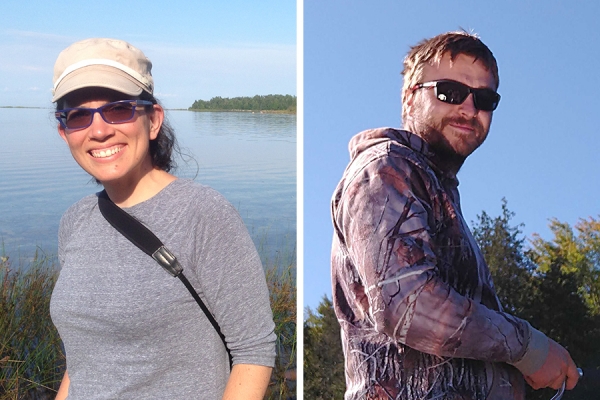 Christina Semeniuk and Drew Marquardt are the inaugural Faculty of Science Research Chairs.
Christina Semeniuk and Drew Marquardt are the inaugural Faculty of Science Research Chairs.
Christina Semeniuk and Drew Marquardt are the inaugural Faculty of Science Research Chairs.
The new two-year research chair program is designed to increase research funding and capacity in the faculty by growing existing research programs, fostering new partnerships and directions, and supporting outstanding faculty researchers.
Dr. Semeniuk is an integrative biology associate professor and researcher with the Great Lakes Institute of Environmental Research (GLIER). She will focus on learning more about how fish species are coping and adapting to the rising temperatures caused by climate change.
“I’ll engage with government, non-government organizations, and Indigenous communities to focus on the big questions arising from rapid ecological change,” says Semeniuk.
“First: how does behavioural flexibility mediate an individual’s ability to persist in situ or shift to more suitable habitat, and second: how do these behavioural traits integrate with underlying physiological or gene-expression phenotypes to generate the adaptive capacity to cope with climate change?”
Semeniuk and her research team will look at how the resulting integrated response influences individual performance and fitness under multiple-stressor scenarios.
“Overall, my lab’s combined research continues to develop the newly developed paradigm of ‘predictive systems ecology’,” she says.
Dr. Marquardt, associate professor in the Department of Chemistry and Biochemistry, cross-appointed to the Department of Physics, is leading a national effort to design and build a prototype Compact Accelerator-based Neutron Source (CANS) centred at the University of Windsor.
“Our CANS design is the first step in removing the threat to Canada’s long-term scientific and economic competitiveness caused by its recent loss of neutron beams. These are versatile and irreplaceable tools for materials research and innovation,” he says.
In addition to helping researchers who require neutrons to study and develop new materials, Marquardt says a neutron source could help radiation oncologists seek innovative treatment methods to reduce the 30,000 cancer deaths in Ontario each year.
“Our neutron source will incorporate both diffraction for materials research and Boron Neutron Capture Therapy into its design. This therapy has potential to be a powerful and highly targeted radiation treatment for aggressive cancers,” he says.
Each research chair will receive $80,000 over a period of two years with funds covering research costs such as personnel, consumables, travel, and supplies with an option for a course release in the second year. The positions commence in Fall 2021.
“I am very proud of our inaugural chair holders,” says Dan Mennill, associate dean of science for graduate studies and research. “We saw tremendous interest in this program, with 18 strong applications from outstanding researchers, and we hope to continue supporting this program on an annual basis.”
